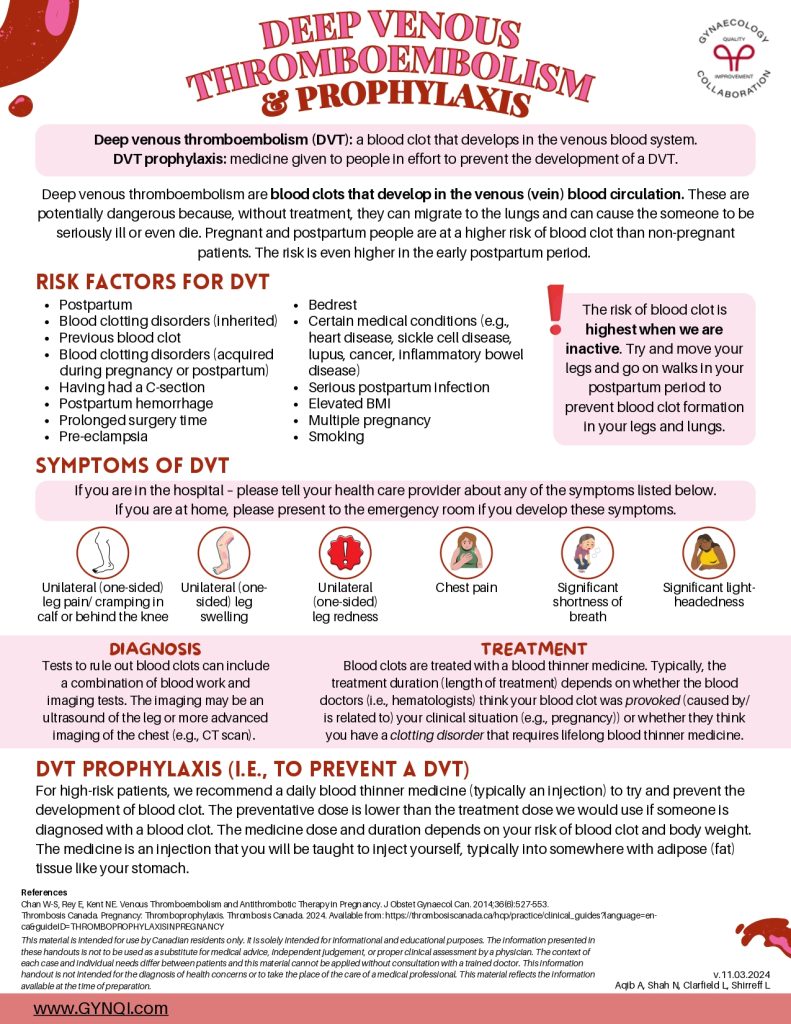
Deep Venous Thromboembolism & Prophylaxis
Deep venous thromboembolism (DVT): a blood clot that develops in the venous blood system.
DVT prophylaxis: medicine given to people in effort to prevent the development of a DVT.
Deep venous thromboembolism are blood clots that develop in the venous (vein) blood circulation. These are potentially dangerous because, without treatment, they can migrate to the lungs and can cause the someone to be seriously ill or even die. Pregnant and postpartum people are at a higher risk of blood clot than non-pregnant patients. The risk is even higher in the early postpartum period.
Risk Factors For DVT
- Postpartum
- Blood clotting disorders (inherited)
- Previous blood clot
- Blood clotting disorders (acquired during pregnancy or postpartum)
- Having had a C-section
- Postpartum hemorrhage
- Prolonged surgery time
- Pre-eclampsia
- Bedrest
- Certain medical conditions (e.g., heart disease, sickle cell disease, lupus, cancer, inflammatory bowel disease)
- Serious postpartum infection
- Elevated BMI
- Multiple pregnancy
- Smoking
The risk of blood clot is highest when we are inactive. Try and move your legs and go on walks in your postpartum period to prevent blood clot formation in your legs and lungs.
Symptoms of DVT
If you are in the hospital – please tell your health care provider about any of the symptoms listed below. If you are at home, please present to the emergency room if you develop these symptoms.
- Unilateral (one-sided) leg pain/cramping in calf or behind the knee
- Unilateral (one-sided) leg swelling
- Unilateral (one-sided) leg redness
- Chest pain
- Significant shortness of breath
- Significant lightheadedness
Diagnosis
Tests to rule out blood clots can include a combination of blood work and imaging tests. The imaging may be an ultrasound of the leg or more advanced imaging of the chest (e.g., CT scan).
Treatment
Blood clots are treated with a blood thinner medicine. Typically, the treatment duration (length of treatment) depends on whether the blood doctors (i.e., hematologists) think your blood clot was provoked (caused by/ is related to) your clinical situation (e.g., pregnancy)) or whether they think you have a clotting disorder that requires lifelong blood thinner medicine.
DVT Prophylaxis (i.e., To Prevent A DVT)
For high-risk patients, we recommend a daily blood thinner medicine (typically an injection) to try and prevent the development of blood clot. The preventative dose is lower than the treatment dose we would use if someone is diagnosed with a blood clot. The medicine dose and duration depends on your risk of blood clot and body weight. The medicine is an injection that you will be taught to inject yourself, typically into somewhere with adipose (fat) tissue like your stomach.



